Difference between revisions of "Poems on Witty Subjects in Congress"
(→"For Farms in Utopia, the Moon, or Some Fairyland," by George Wythe) |
(→"A Commissioner, to the People of Philadelphia," by William Ellery) |
||
| Line 287: | Line 287: | ||
| style="width: 550px; white-space: nowrap; margin: 20px 0 20px 20px; background-color: #f9f7e0; border: 1px solid #000000; padding: 20px 50px;" | | | style="width: 550px; white-space: nowrap; margin: 20px 0 20px 20px; background-color: #f9f7e0; border: 1px solid #000000; padding: 20px 50px;" | | ||
<center>A Commissioner, to the people of P _ _ _ _ _ a</center> | <center>A Commissioner, to the people of P _ _ _ _ _ a</center> | ||
| − | Attend all ye People of | + | Attend all ye People of ev'ry degree<br /> |
No longer pretend that your Country youll free<br /> | No longer pretend that your Country youll free<br /> | ||
Declare for your Treasons a hearty Contrition<br /> | Declare for your Treasons a hearty Contrition<br /> | ||
Regard as you tender your lives Admonition<br /> | Regard as you tender your lives Admonition<br /> | ||
E're too late to flee from impending Perdition<br /> | E're too late to flee from impending Perdition<br /> | ||
| − | Who like me to the | + | Who like me to the King Allegiance will swear<br /> |
And future Submission to Congress forbear<br /> | And future Submission to Congress forbear<br /> | ||
Leave all his old Friends to the Parliaments Fury<br /> | Leave all his old Friends to the Parliaments Fury<br /> | ||
Let Rebels be hang'd without Judge or Jury<br /> | Let Rebels be hang'd without Judge or Jury<br /> | ||
Escapes condemnation to gibbet or halter<br /> | Escapes condemnation to gibbet or halter<br /> | ||
| − | Nor | + | Nor needs forfeiture fear unless times should alter. |
|} | |} | ||
| | | | ||
Revision as of 12:54, 15 April 2014
George Wythe and Willam Ellery, "Poems on Witty Subjects in Congress," American Revolutionary War Manuscripts Collection, Boston Public Library, MS.Ch.E.8.31-33.[1]
Contents
- 1 Manuscript text, November-December 1776
- 1.1 "A Member of the Antinovanglian Faction to W. E.," by George Wythe (VA)
- 1.2 "A Novanglican to G.W.," by William Ellery (RI)
- 1.3 "Instead of Controlling Our Mary's Cross Humor," by William Ellery
- 1.4 "For Farms in Utopia, the Moon, or Some Fairyland," by George Wythe
- 1.5 "Epigram," by William Ellery
- 1.6 "Answer to Epigram," by George Wythe
- 1.7 "Unless You Will Take One Line for Your Ten," by William Ellery
- 1.8 "You've Not only Quitted Your Arrear," by George Wythe
- 1.9 "Some Mere Poetaster Call Tully," by George Wythe
- 1.10 "The Gen'rous Idea Your Last Piece Expresses," by William Ellery
- 1.11 "A Commissioner, to the People of Philadelphia," by William Ellery
- 2 See also
- 3 References
- 4 External links
Manuscript text, November-December 1776
"A Member of the Antinovanglian Faction to W. E.," by George Wythe (VA)
|
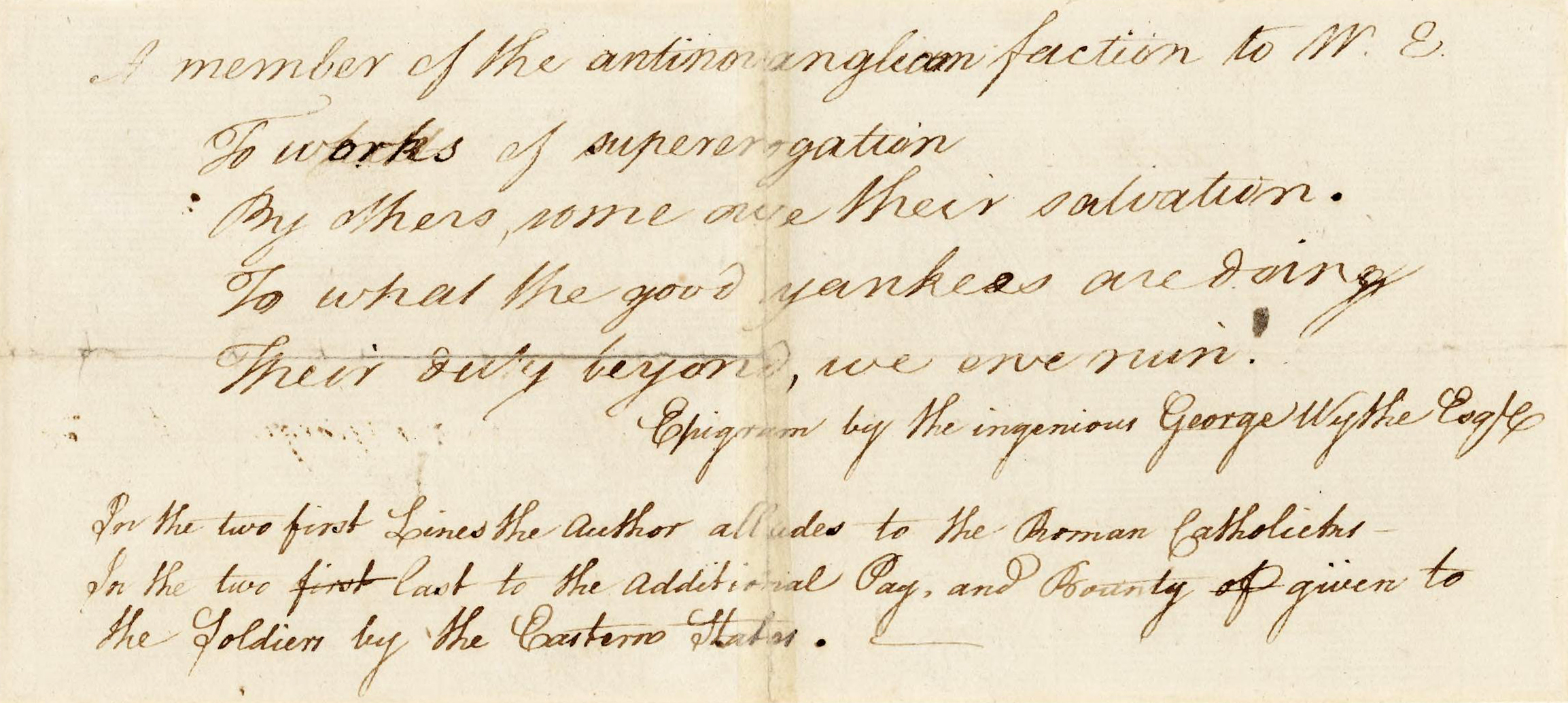 Page seven from Poems on Witty Subjects in Congress, from the Boston Public Library's American Revolutionary War Manuscripts collection. |
"A Novanglican to G.W.," by William Ellery (RI)
|
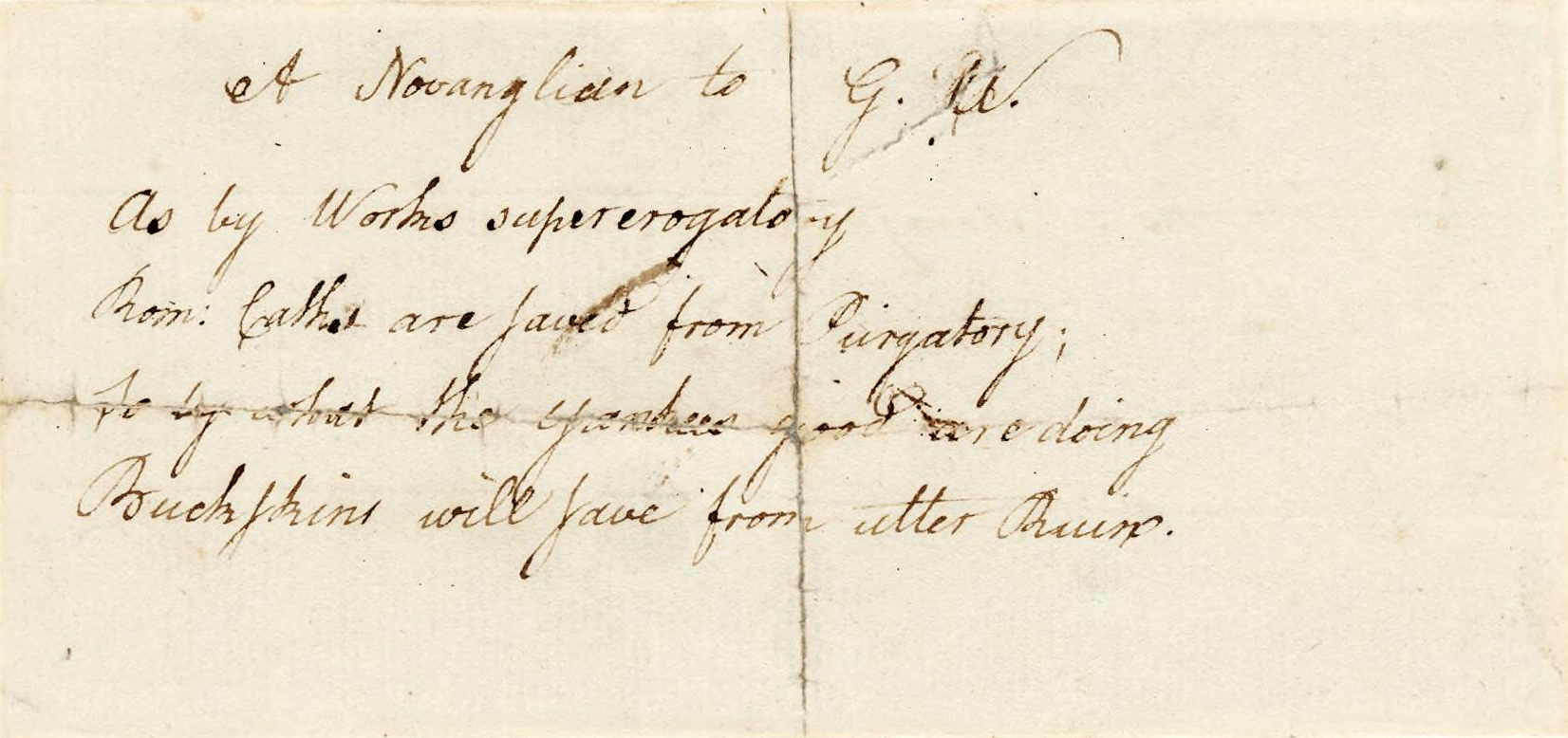 Page three from Poems on Witty Subjects in Congress, from the Boston Public Library's American Revolutionary War Manuscripts collection. |
"Instead of Controlling Our Mary's Cross Humor," by William Ellery
|
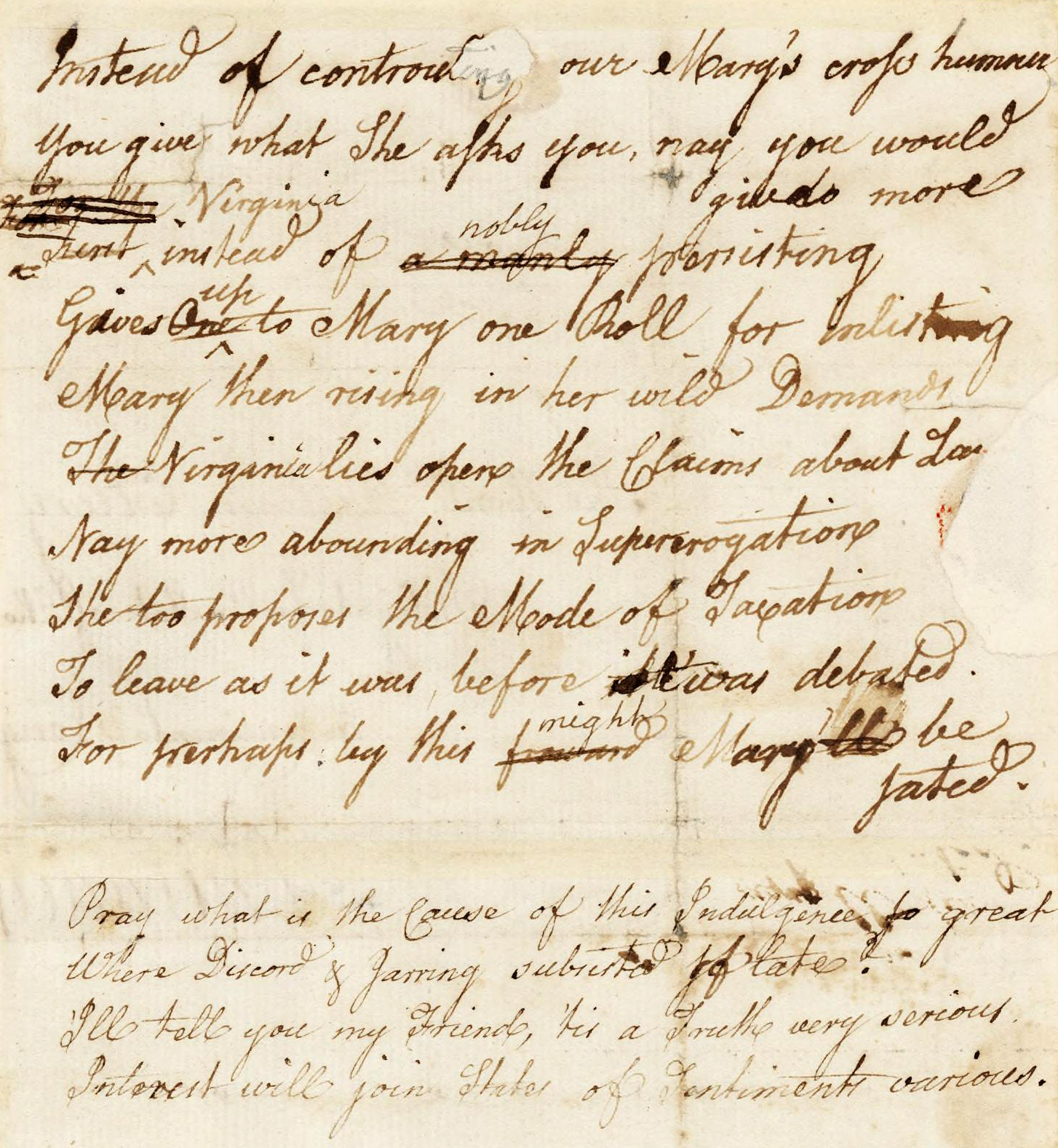 Page five from Poems on Witty Subjects in Congress, from the Boston Public Library's American Revolutionary War Manuscripts collection. |
"For Farms in Utopia, the Moon, or Some Fairyland," by George Wythe
|
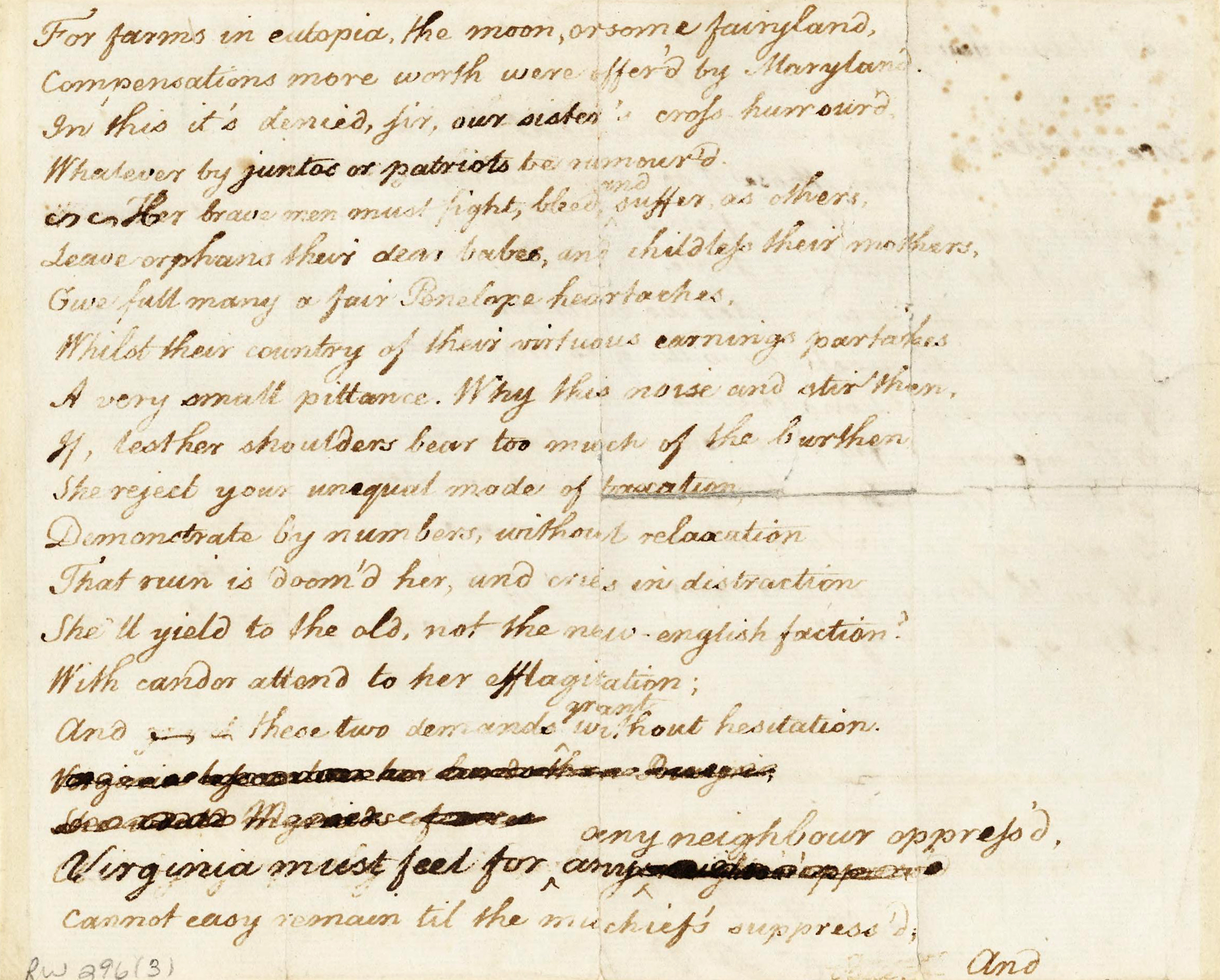 Page nine from Poems on Witty Subjects in Congress, from the Boston Public Library's American Revolutionary War Manuscripts collection. | |
|
And if slaves you include in your capitation, |
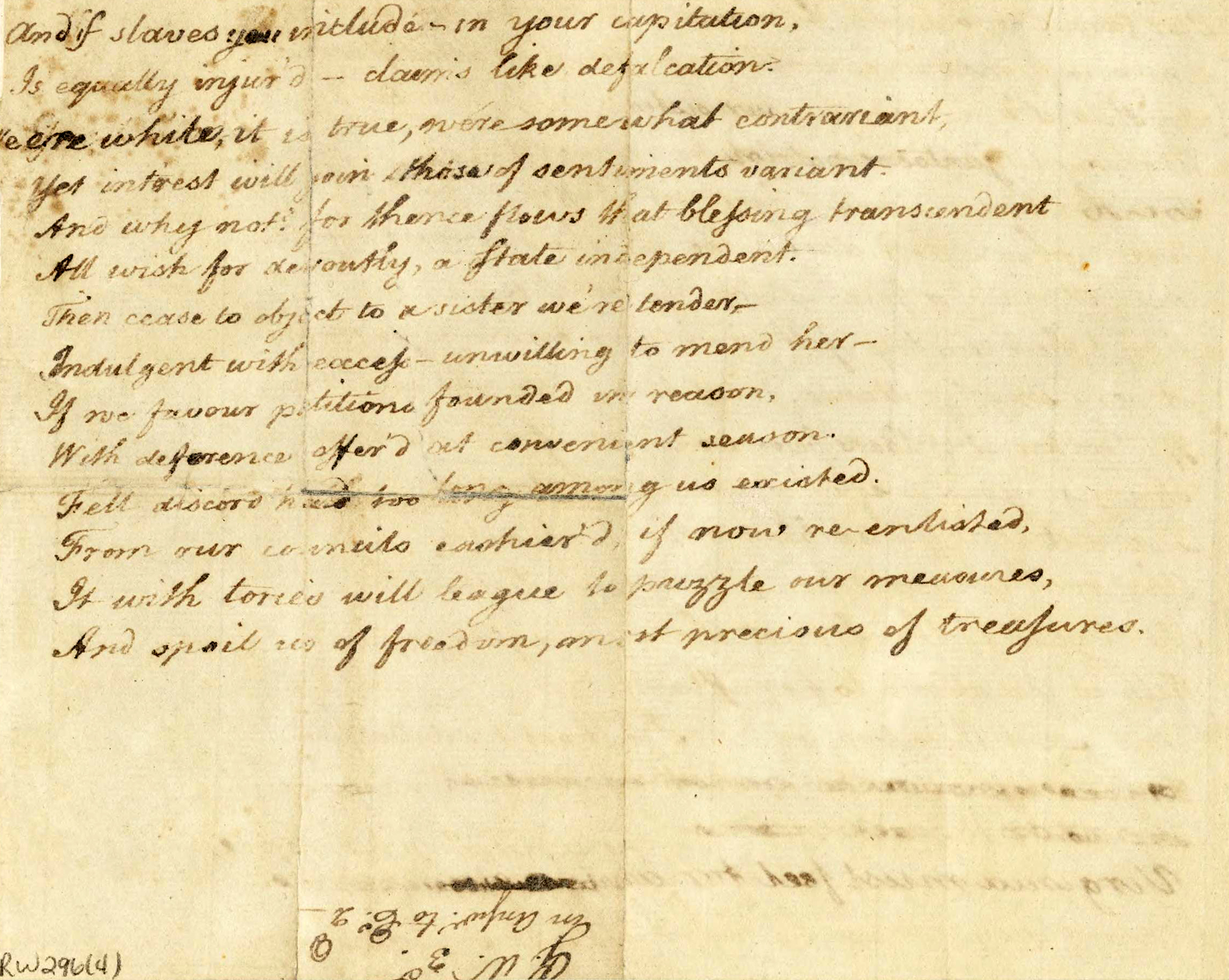 Page ten from Poems on Witty Subjects in Congress, from the Boston Public Library's American Revolutionary War Manuscripts collection. |
"Epigram," by William Ellery
|
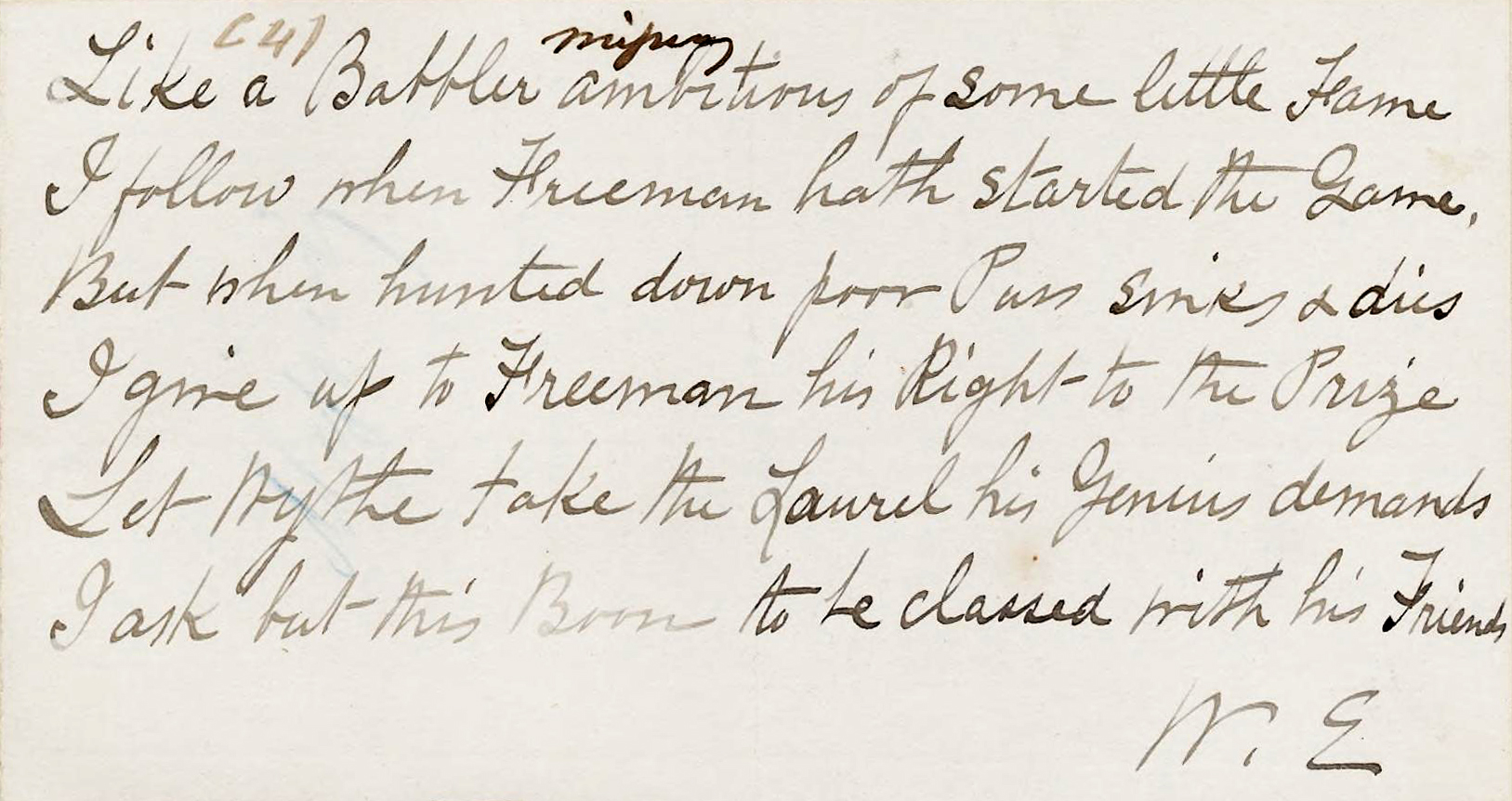 Page eleven from Poems on Witty Subjects in Congress, from the Boston Public Library's American Revolutionary War Manuscripts collection. |
"Answer to Epigram," by George Wythe
|
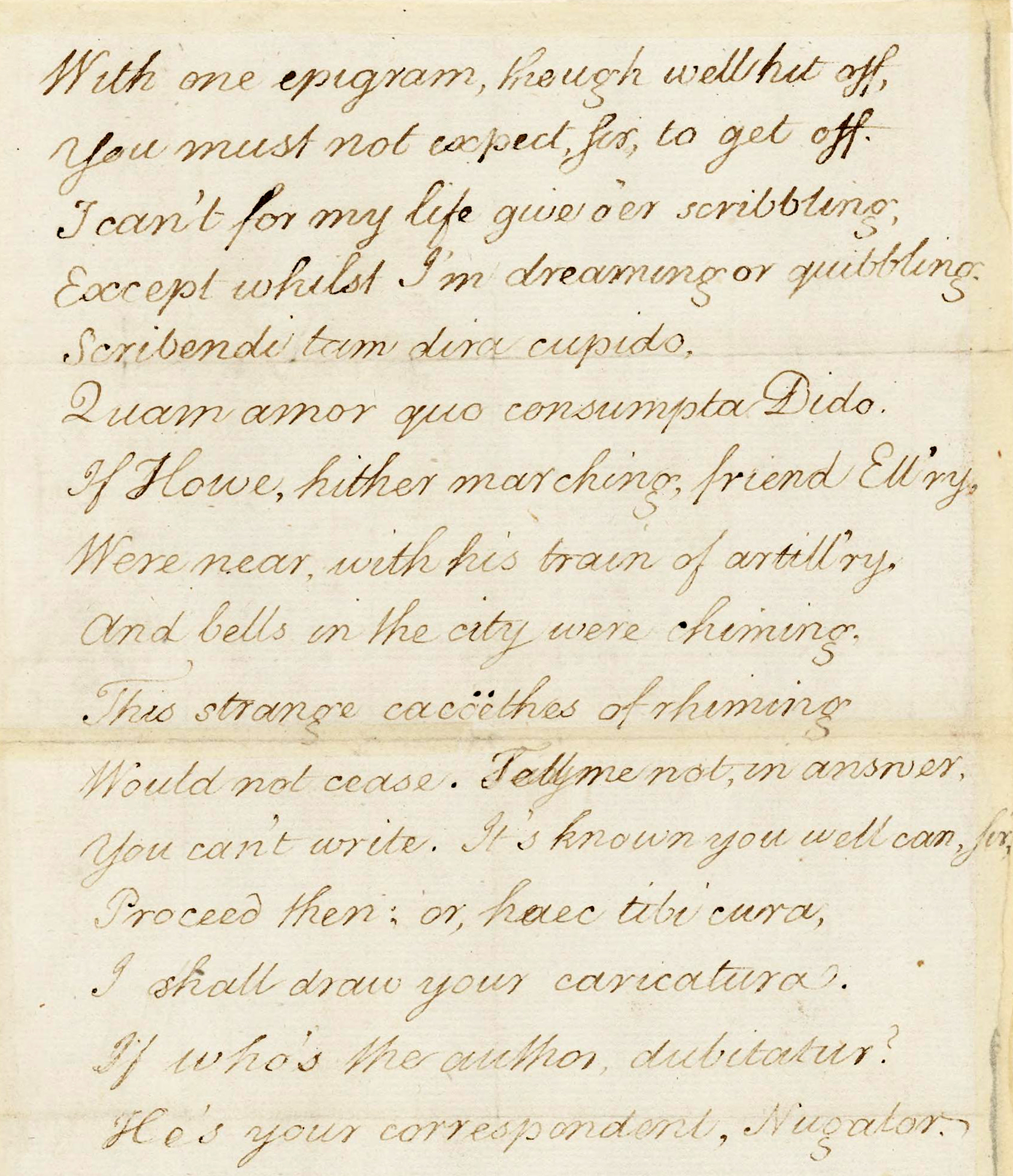 Page twenty-one from Poems on Witty Subjects in Congress, from the Boston Public Library's American Revolutionary War Manuscripts collection. |
"Unless You Will Take One Line for Your Ten," by William Ellery
|
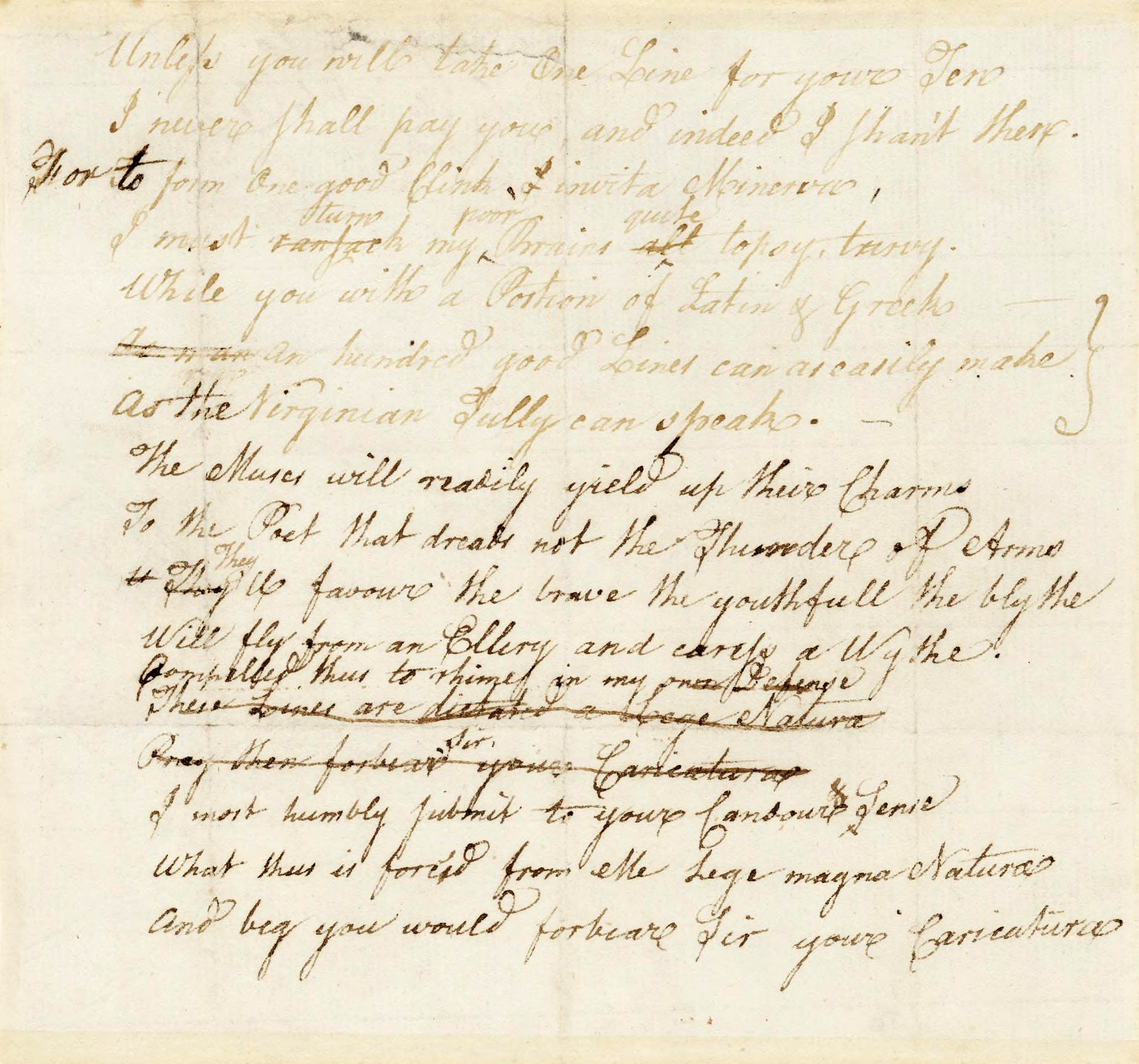 Page twenty-three from Poems on Witty Subjects in Congress, from the Boston Public Library's American Revolutionary War Manuscripts collection. |
"You've Not only Quitted Your Arrear," by George Wythe
|
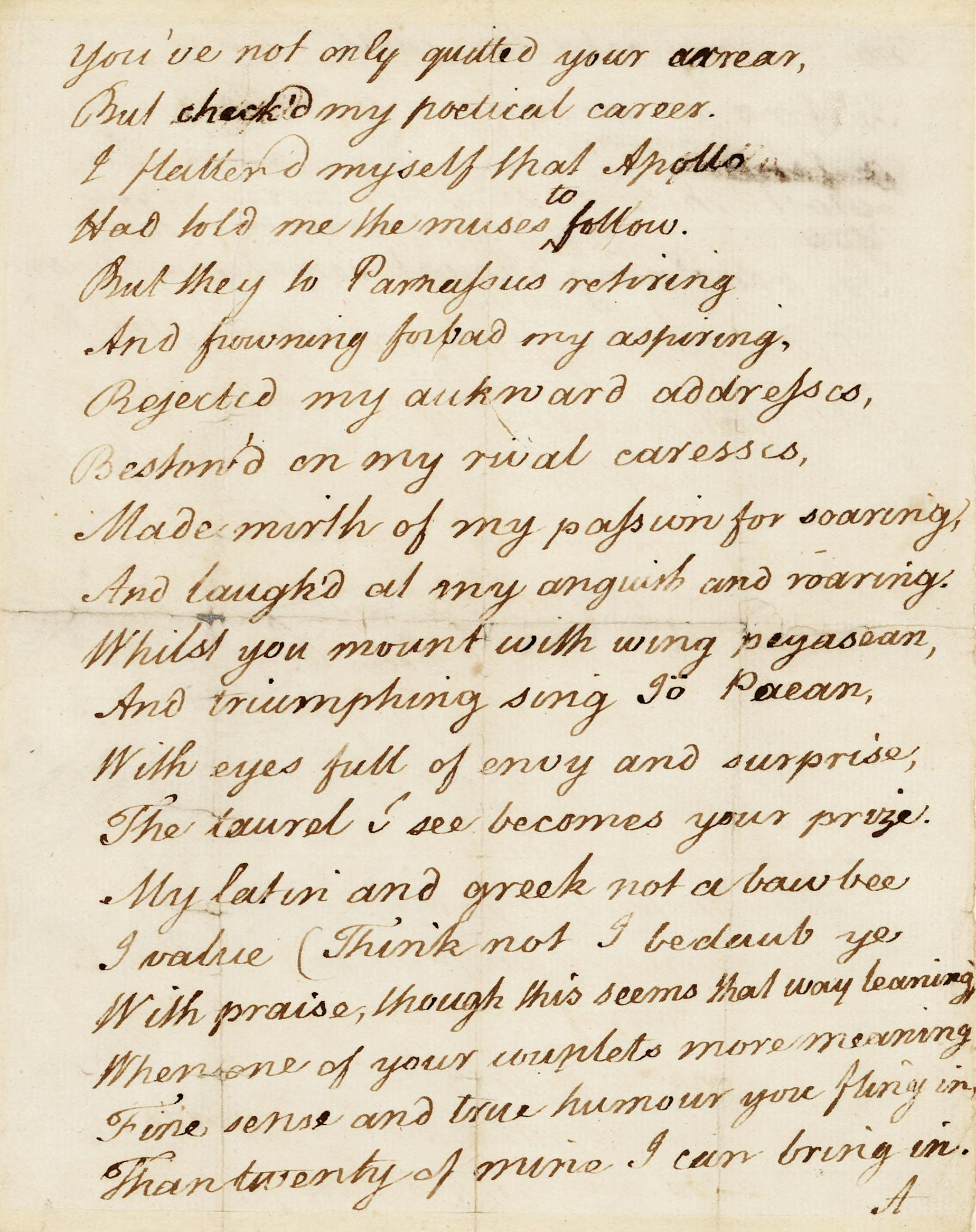 Page fifteen from Poems on Witty Subjects in Congress, from the Boston Public Library's American Revolutionary War Manuscripts collection. |
"Some Mere Poetaster Call Tully," by George Wythe
|
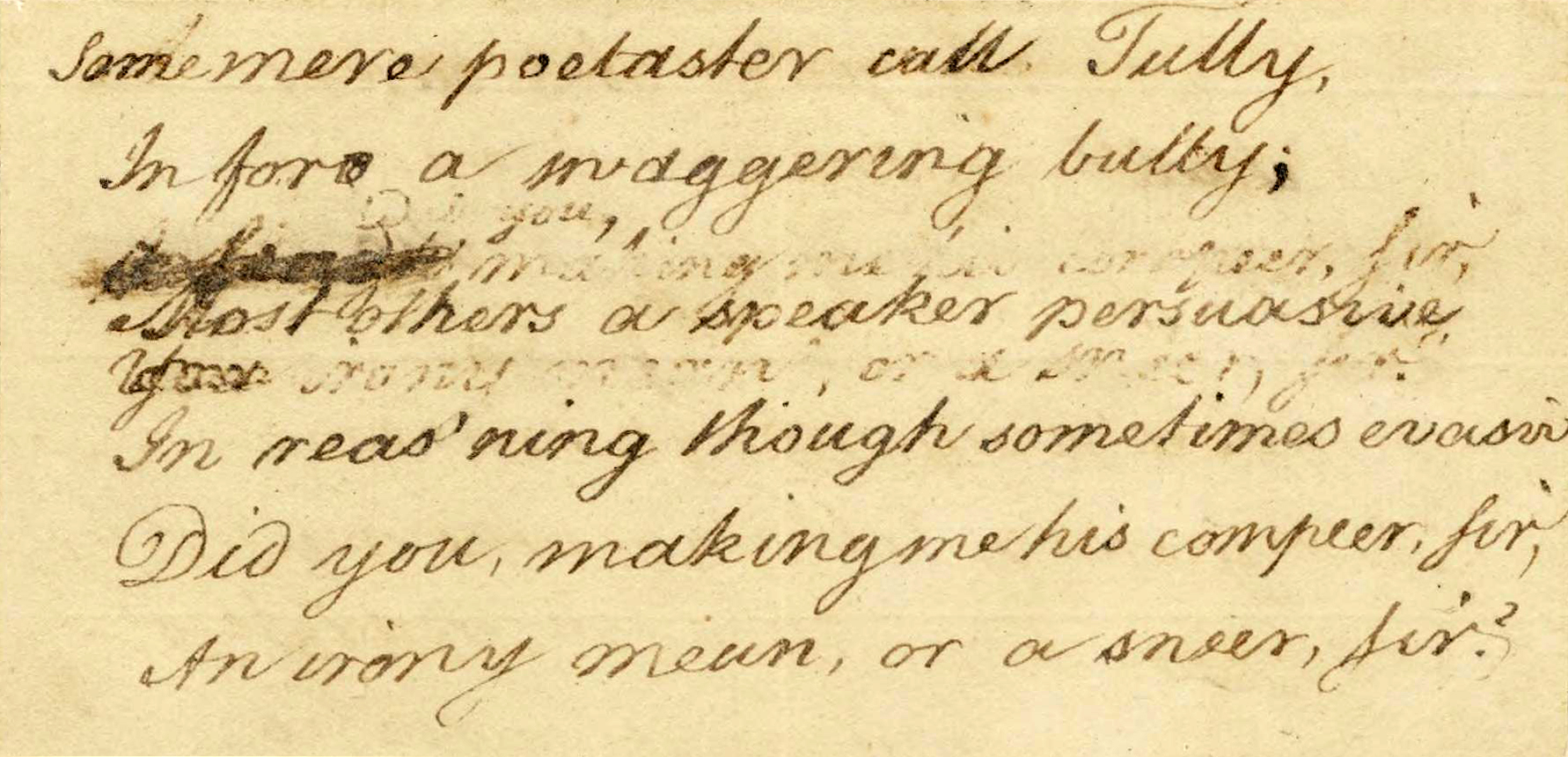 Page sixteen from Poems on Witty Subjects in Congress, from the Boston Public Library's American Revolutionary War Manuscripts collection. |
"The Gen'rous Idea Your Last Piece Expresses," by William Ellery
|
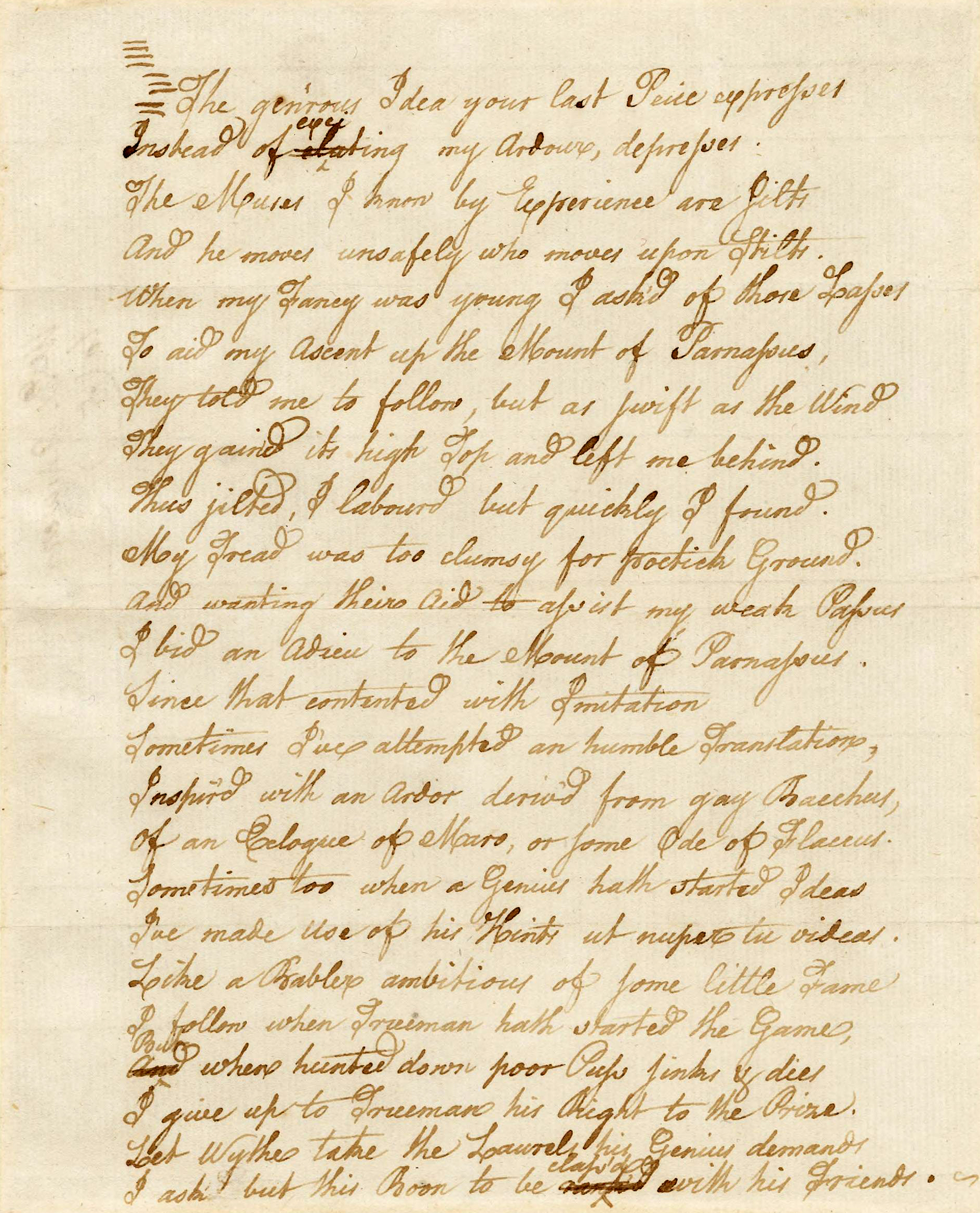 Page twenty-five from Poems on Witty Subjects in Congress, from the Boston Public Library's American Revolutionary War Manuscripts collection. |
"A Commissioner, to the People of Philadelphia," by William Ellery
|
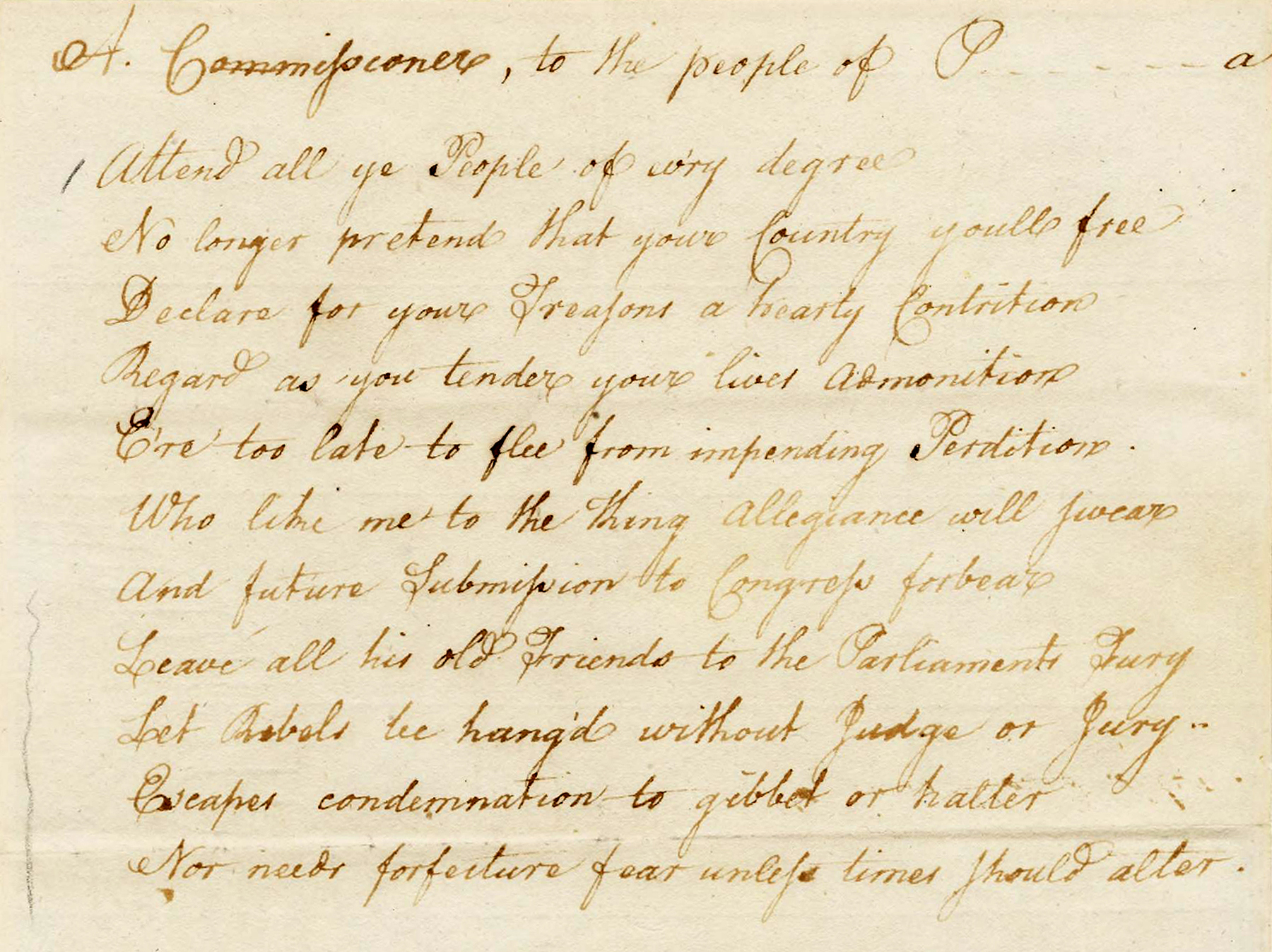 Page one from Poems on Witty Subjects in Congress, from the Boston Public Library's American Revolutionary War Manuscripts collection. |
See also
References
- ↑ See W. Edwin Hemphill, "George Wythe Courts the Muses," William and Mary Quarterly 3rd ser., 9, no. 3 (July 1952), 338-345.
- ↑ "Novanglian": New Englander.
- ↑ "Dire desire to write," paraphrase of Virgil, Aeneid, Book V, line 721.
- ↑ "The love which consumed Dido," Queen of Carthage.
- ↑ Ovid, Ex Ponto III, xxxvi.
- ↑ Jester, clown.
- ↑ Defy nature, literally "go against Minerva's will." Cicero, De Officiis, I, 31, 110.
- ↑ Wythe is a Virginian Cicero: [[wikipedia:Marcus Tullius Cicero|]].
- ↑ A great law of Nature.
- ↑ Classical Greek cry of exultation or triumph, traditionally addressed to Apollo the healer.
- ↑ "As of late, you see."
External links
- Boston Public Library, Special Collections.
- American Revolutionary War Manuscripts at the Boston Public Library, Internet Archive.
- Read these poems in the Internet Archive.